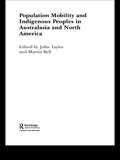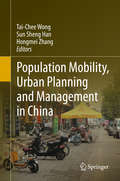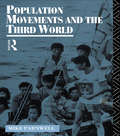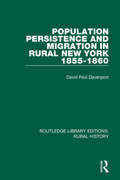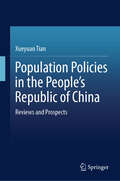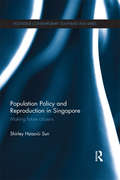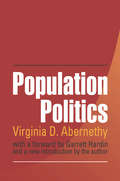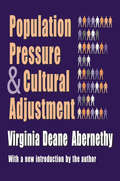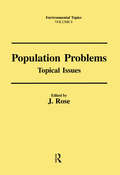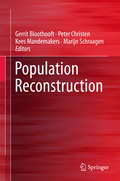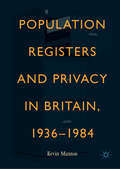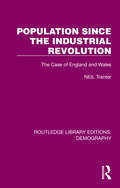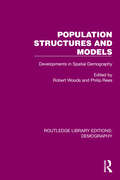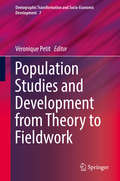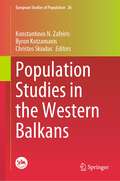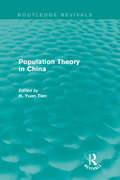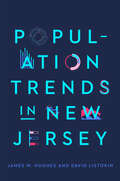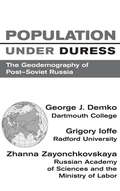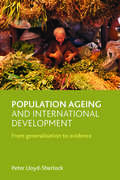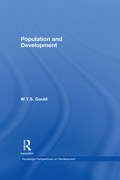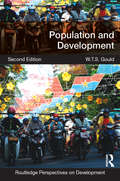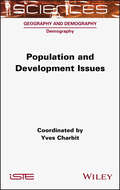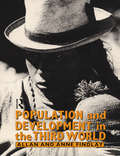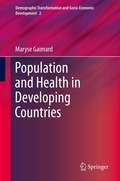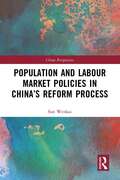- Table View
- List View
Population Mobility and Indigenous Peoples in Australasia and North America (Routledge Research in Population and Migration)
by John Taylor Martin BellThis book draws together relevant research findings to produce the first comprehensive overview of Indigenous peoples' mobility. Chapters draw from a range of disciplinary sources, and from a diversity of regions and nation-states. Within nations, mobility is the key determinant of local population change, with implications for service delivery, needs assessment, and governance. Mobility also provides a key indicator of social and economic transformation. As such, it informs both social theory and policy debate. For much of the twentieth century conventional wisdom anticipated the steady convergence of socio-demographic trends, seeing this as an inevitable concomitant of the development process. However, the patterns and trends in population movement observed in this book suggest otherwise, and provide a forceful manifestation of changing race relations in these new world settings.
Population Mobility, Urban Planning and Management in China
by Tai-Chee Wong Sun Sheng Han Hongmei ZhangThis volume contains essays that examine contemporary urban and regional planning and development in China. Through in-depth theoretical and empirical analysis, it provides insights into the urban policies and operational mechanisms of this colossal transitional economy which has presented unprecedented challenges and dynamics. Inside, readers will discover the causes and consequences of rapid urbanization that have led to a series of environmental, economic and social planning and management measures designed to achieve quality urban living. The essays also detail efforts in adopting the latest options in city building such as specific urban planning approaches in developing large city regions, building cities without slums, constructing new townships and green urbanism, including eco-city and sustainable transport. In addition, coverage explores financial management and support as a means to encourage urbanization and urban economic growth in less-developed regions. Overall, the volume offers a wealth of concrete, detailed information on conditions in different regions of China and features an extensive range of content, methods and theory. It provides readers with a comprehensive portrait of the chain relationship between rapid urbanization, spatial planning and management throughout the country. The book will serve as a useful reference for national and international consultancy services doing business or serving public interest in China. It will also be of interest to an international audience seeking a better understanding of urban development and planning in China, including university teachers, students, government agencies and general readers.
Population Movements and the Third World (Routledge Introductions to Development)
by Mike ParnwellThe interrelationship between migration and development is complex. The causes of migration stem from the uneveness of the development process and the effects exert a powerful influence on the pattern and process of development. This volume explores both the concepts and facts behind the main forms of population movement in the third world today, particularly rural-urban migration. Examining the causes and consequences of migration, the author assesses the implications for planning and policy-makers.
Population Persistence and Migration in Rural New York, 1855-1860 (Routledge Library Editions: Rural History #4)
by David Paul DavenportThis title, first published in 1989, explores the population change in America during the 1800s by closely examining frontier settlement, urbanisation, and depopulation and emigration from rural areas of the north-eastern United States. Population Persistence and Migration in Rural New York, 1855-1860 will be of interest to students of history and human geography.
Population Policies in the People’s Republic of China: Reviews and Prospects
by Xueyuan TianFrom an insider&’s perspective, this book elaborates on the three stages of population policies since the founding of the People&’s Republic of China (PRC). As a key policy discussant and drafter, the author incorporates some valuable documentaries and manuscripts that have not been revealed in the extant literature and brings in new theoretical angles for interpretations of population policies in the PRC. This book begins with a brief review of population policies in ancient China and then focuses on the population debates and growing concerns for population growth in the first thirty years of the PRC. This is followed by telling the whole story of the PRC&’s one-child policy, including theoretical discussions, the policy&’s situated social context, policy details, and strategies. Lastly, this book discusses the population changes and trends in the twenty-first century and provides advice on China&’s population development strategies in the future. Throughout the book, the author draws on his own experience in population policy-making to provide new insights in his review of China&’s one-child policy and facilitates a delineation of population changes among social developments, population debates, and government policy changes. This book is intended for readers who are interested in population policies of the PRC. It is particularly useful for students and researchers specializing in China&’s population studies and serves as a trustworthy source for those wanting a holistic picture of the PRC&’s population policies.
Population Policy and Reproduction in Singapore: Making Future Citizens (Routledge Contemporary Southeast Asia Series)
by Shirley Hsiao-Li SunThis book examines the relationship between population policies and individual reproductive decisions in low-fertility contexts. Using the case study of Singapore, it demonstrates that the effectiveness of population policy is a function of competing notions of citizenship, and the gap between seemingly neutral policy incentives and the perceived and experienced disparate effects. Drawing on a substantial number of personal interviews and focus groups, the book analyzes the developmental welfare state’s overarching emphasis of citizen responsibility, and examines population policies that reinforce social inequalities and ignore cultural diversity. These factors combine to undermine elaborate state policy efforts in encouraging citizens’ biological reproduction. The book goes on to argue that in order to facilitate positive fertility decisions, the state needs to modify the “economic production at all cost” approach and pay much more attention to the importance of social rights. This suggests that the Singapore government might profitably approach the phenomenon of very low fertility with major initiatives similar to those of other advanced industrialized societies. This book offers a significant contribution to the literature on social policy, East Asian and Southeast Asian studies.
Population Politics: The Choices That Shape Our Future
by Virginia Abernethy Garrett HardinInternational efforts to regulate fertility rates so that populations do not grow beyond the earth's capacity have included technical assistance and capital; improved health care conditions to lower the risk of infant mortality; increased opportunities to develop literacy; the democratization of governments; and several decades of liberal immigration and refugee policies favoring third world nations. The persistence of high fertility despite international efforts confounds demographers. 'Population Politics' brilliantly dissects the paradigm responsible for the counterproductive efforts of nations and international agencies. Abernethy, a renowned anthropologist, shows why policies hamper the shift to lower fertility. Ireland, Indonesia, Cuba, China, Turkey and Egypt are but a few of the countries Abernethy examines, showing how economic, sociocultural, and agricultural factors that have caused population growth can be harnessed to stabilize population size. 'Population Politics' is a provocative examination of the influence of aid and liberal immigration policies on world population growth, and often counterproductive to the role of the United States as an industrial power. This volume's uniquely interdisciplinary perspective will enlighten the lay reader, as well as demographers and epidemiologists, conservationists, reproduction and family specialists, agricultural economists, and public health personnel. Virginia D. Abernethy is professor emeritus of psychiatry (anthropology) at Vanderbilt Medical School and was for 11 years the editor of the scholarly journal 'Population and Environment. Garrett Hardin is emeritus professor of human ecology in the Department of Biological Sciences and the University of California, Santa Barbara.
Population Pressure and Cultural Adjustment
by Virginia Deane AbernethyIntegrating research from anthropology, biology, and history, this provocative, brilliant book proposes a theory of demographic equilibrium. The author's hypothesis is that human beings, like many other species, are able to adjust their population numbers to the carrying capacity of the environment. Abernethy points out that in response to perception of scarcity or abundance of resources, culturally mediated values, beliefs and behavioral patterns are modified in ways that can either raise or lower rates of population growth. Abernethy in this way moves beyond the ideological debates that have sundered the field of policy and population. In real world time and space, cultural adjustments that balance population and resources are made over a long stretch in relatively stable or known environments. These adjustments also operate in processes that involve technological advances that appear to increase carrying capacity, and these usually act to support and underwrite population growth in any given area. In her new introduction to this first paperback edition, Abernethy shows how many of the cultural changes the book predicted in 1979 have come to pass. She details a complex of behaviors that favor single life-styles or small family size that have contributed to low fertility rates among native-born Americans while fertility rates among immigrants continue to climb. Population Pressure and Cultural Adjustment is not simply a theoretical slogan, but discusses a rich set of different cultural situations where this homeostatic process has been disrupted or aborted. Often, disruption occurs after the infusion of foreign value systems as well as new forms of technological innovation, or when highly permeable social boundaries result in the importation of resources for which the limits and consequences are not fully appreciated by the host population. This work will inevitably be controversial because of its implications for the limits as well as the potential of public policy in both advanced and underdeveloped societies.
Population Problems: Topical Issues (Environmental Topics Ser. #Vol. 8)
by J. RoseThe effects of the rapidly expanding human population on the environment and the planet's future is a matter of increasing concern and lively debate. This timely collection of essays discusses some of the most important aspects of the population growth phenomenon and offers potential solutions. Chapters analyse population dynamics, carrying capacity of the environment, water and food supply, effects on tribal societies, and the AIDS pandemic.
Population Reconstruction
by Gerrit Bloothooft Peter Christen Kees Mandemakers Marijn SchraagenThis book addresses the problems that are encountered, and solutions that have been proposed, when we aim to identify people and to reconstruct populations under conditions where information is scarce, ambiguous, fuzzy and sometimes erroneous. The process from handwritten registers to a reconstructed digitized population consists of three major phases, reflected in the three main sections of this book. The first phase involves transcribing and digitizing the data while structuring the information in a meaningful and efficient way. In the second phase, records that refer to the same person or group of persons are identified by a process of linkage. In the third and final phase, the information on an individual is combined into a reconstruction of their life course. The studies and examples in this book originate from a range of countries, each with its own cultural and administrative characteristics, and from medieval charters through historical censuses and vital registration, to the modern issue of privacy preservation. Despite the diverse places and times addressed, they all share the study of fundamental issues when it comes to model reasoning for population reconstruction and the possibilities and limitations of information technology to support this process. It is thus not a single discipline that is involved in such an endeavor. Historians, social scientists, and linguists represent the humanities through their knowledge of the complexity of the past, the limitations of sources, and the possible interpretations of information. The availability of big data from digitized archives and the need for complex analyses to identify individuals calls for the involvement of computer scientists. With contributions from all these fields, often in direct cooperation, this book is at the heart of the digital humanities, and will hopefully offer a source of inspiration for future investigations.
Population Registers and Privacy in Britain, 1936—1984
by Kevin MantonThis book examines the fraught political relationship between British governments, which wanted information about peoples’ lives, and the people who desired privacy. To do this it looks at something that Britain only experienced in wartime, a centralized and up-to-date list of everyone in the country: a population register. The abolition of this wartime system is contrasted with later attempts to reintroduce registration, and the change in the political mind-set driving these later schemes to develop centralised webs of so-called objective data is examined. These policies were confronted by privacy campaigns, studied here, but it is shown how government responses succeeded in turning political debates about data into technical discussions about computerization; thus protecting its data, largely on paper, from oversight. This reformulation also shaped the 1984 Data Protection Act, which consequently did not protect privacy but rather increased government’s ability to gain knowledge of, and hence power over, the people.
Population Since the Industrial Revolution: The Case of England and Wales (Routledge Library Editions: Demography #13)
by Neil TranterOriginally published in 1973, this book is an introduction to the study of population history since the Industrial Revolution and focuses on the experience of England and Wales. It provides both a comprehensive survey of the vast array of specialist literature and a thorough explanation of the sources and methodology of historical demographic analysis. Throughout special emphasis is given to the need to recognise that the historical pattern of population growth in England and Wales has been broadly similar to that observed elsewhere in Western Europe. The sources and techniques of historical demography are discussed and the general outline of population growth between 1688 and 1939 examined. The factors responsible for the dramatic increase in population growth during the late 18th and 19th Centuries are analysed as are the causes of the abrupt down-turn in rate of population following World War 1. The part played by population change in the development of the British economy and the impact of population change on society are also covered. By integrating the social and economic impact of population change with sources and methods, this text fills a gap and will be of essential reading to students in economics, sociology and social history.
Population Structures and Models: Developments in Spatial Demography (Routledge Library Editions: Demography #14)
by Robert Woods Philip ReesOriginally published in 1986, this volume brings together geographical modelling of population change and demographic analysis of population structures and pattern. These 2 strands are interwoven in 3 key review chapters that summarize the study of spatial and temporal patterns of population, the modelling of spatial populations and the estimation of population processes. Findings reported include: An account of demographic transition; an exposé of the myth of ‘no fertility rises’ in the developing world in the 20th Century; a theory of population accounting; predicting migration flows for a system of regions; microsimulation methods to model population change; and demographic and economic processes integrated in an urban region model.
Population Studies and Development from Theory to Fieldwork
by Véronique PetitThis book addresses major population and development issues: fertility and reproductive health, migrations, gender, education, poverty and inequalities. To that aim it revisits and considerably enlarges Kingsley Davis’ 1963 theory of change and response, using interdisciplinary methodologies. On the basis of four decades of field research (1985-2015), it questions the rationality of the actors, how culture shapes socio-demographic behaviours, in a context of modernity and globalisation. More specifically, it casts new light on the interactions of individuals, families, networks and local communities with the State and its population policy.
Population Studies in the Western Balkans (European Studies of Population #26)
by Christos Skiadas Konstantinos N. Zafeiris Byron KotzamanisThis book is a collection of scientific studies regarding the biological, economic, historical, health, social, and other aspects of the populations of the western Balkans, a geographic area with distinct as well as diverse socioeconomic backgrounds, political systems, ethnic characteristics, development, and history. Through providing data analyses, statistical methodologies, and important applications, the book addresses and explores topics such as temporary migration and human resource availability, depopulation, and the immigration future, returning migrants, poverty, population dynamics and birth rate trends, reproduction and family creation, aging, mortality and health developments, and much more. As such, this book is of great importance in understanding the mechanisms of population change and dynamics in an European area and provides a valuable guide for researchers, policy makers, and practitioners from various disciplines.
Population Theory in China (Routledge Revivals)
by H. Yuan TienProfessor Ma Yinchu�s New Population Theory was widely criticised and discredited in the early years of the People�s Republic of China. However, in 1979, the Chinese government began to accept his hypothesis that the country could not afford more than a 2% increase in population and agreed that the population must be controlled. As a result, the government began setting out campaigns to promote single-child families and measures to curb fertility in an attempt to reduce the rate of natural births. First published in 1980, H. Yuan Tien�s study demonstrates the major changes that took place in China in 1979, how the acceptance of New Population Theory affected the country as a whole and what policies were likely to be put into place as an after-effect. This title will be of interest to students of Asian Studies and International Politics.
Population Trends in New Jersey
by David Listokin James W. HughesTo fully understand New Jersey in the 2020s and beyond, it is crucial to understand its ever-changing population. This book examines the twenty-first century demographic trends that are reshaping the state now and will continue to do so in the future. But trend analysis requires a deep historical context. Present-day New Jersey is the result of a long demographic and economic journey that has taken place over centuries, constantly influenced by national and global forces. This book provides a detailed examination of this journey. The result is present-day New Jersey. The authors also highlight key trends that will continue to transform the state: domestic migration out of the state and immigration into it; increasing diversity; slower overall population growth; contracting fertility; the household revolution and changing living arrangements; generational disruptions; and suburbanization versus re-urbanization. All of these factors help place in context the result of the 2020 decennial U.S. Census. While the book focuses on New Jersey, the Garden State is a template of demographic, economic, social, and other forces characterizing the United States in the twenty-first century.
Population Under Duress: Geodemography Of Post-soviet Russia
by George J DemkoThe demographic history of twentieth-century Russia has been marked by a series of tragedies. Calamitous wars, revolutions, civil strife, and political murders have resulted in unparalleled mortality rates, depressed fertility rates, and sadly unprecedented demographic patterns of all types. This volume explores the most recent problems afflicting the Russian population in the post?Cold War era.The demise of the Soviet Union has brought new hardships?the collapse of the health-care system, internal strife, and economic disruptions?to the people and has deeply affected demographic processes throughout Russia. The contributors explore key trends, from increasing mortality rates and decreasing birth rates to refugee flows into Russia and the ?brain drain? out of Russia. Problems of aging, increased infant mortality, and urban and rural population change are discussed in detail for each major region.Rarely has there been a better opportunity to examine the spatial, economic, psychological, and political factors contributing to demographic stress in a current setting. These demographic processes are not only unique as a domestic social phenomenon but are also immensely significant in their global impact, influencing international migration and foreign aid.
Population ageing and international development: From generalisation to evidence
by Peter Lloyd-SherlockOver the next 40 years the number of people aged 60+ in the world, many of whom live in developing regions, will grow by 1¼ billion. What will old age be like for them? This original book provides an analysis of links between development, population ageing and older people, challenging some widely held misconceptions. It highlights the complexity of international experiences and argues that the effects of population ageing on development are influenced by policy choices. The book will be of interest to a range of academic disciplines, including economics, gerontology, social policy and development studies as well as policy-makers and practitioners concerned with developing countries.
Population and Development
by W.T.S. GouldPopulation and Development addresses important issues at the heart of the problems of developing countries. How these countries address the common difficulties of population growth, including mortality and fertility decline, population redistribution including internal migration and urbanization, and also international migration, for both source countries and for destination countries. How and why has population change affected development – both positively and negatively? How and why has development affected population change – both growth and distribution? The book opens with an introduction, preceding the ten substantive chapters, covering some of the broader issues for population studies and development studies and the relationships between them. The first three chapters set out the main concepts and theoretical discussions on how population affects development and also how development affects population. Detailed chapters then cover each of the three main components of population change – fertility, mortality and finally migration. These are followed by chapters on the impacts of age structures, including the potential for a demographic dividend, and of the more qualitative aspects of human resource development through formal education and ICTs, with further chapters on population policies and population futures. The book incorporates illustrative text boxes and case studies on regions in Africa, the Middle East and Asia which elaborate the broader theoretical and conceptual substance of the ten major chapters. Each chapter has ‘Discussion Questions’ and ‘Sources and Further Reading’ sections, and there is an extensive integrated References section. The arguments of the book bring together a large but fairly loosely integrated literature from population studies, development studies and geography in a conceptually coordinated, empirically wide-ranging and challenging discussion. It is targeted at an audience in undergraduate courses in Geography and in Masters courses in Development Studies and Population Studies. The books succinct but erudite structure means it can be used either as a course text book, or as a basic reference on a range of current issues and likely concerns at the interface between Geography, Development Studies and Population Studies.
Population and Development
by W.T.S. GouldThe new edition of Population and Development offers an up-to-date perspective on one of the critical issues at the heart of the problems of development for all countries, and especially those that seek to implement major economic and social change: the reflexive relationships between a country’s population and its development. How does population size, distribution, age structure and skill base affect development patterns and prospects? How has global development been affected by regional population change? Retaining the structure of the well-received first edition, the book has been substantially revised and updated. The opening chapters of the book establish the theoretical and historical basis for examining the basic reflexive relationship, with exploration of the Malthusian perspective and its critics to examine how population change affects development, and exploration of the Demographic Transition Model and its critics to examine how, why and to what extent development drives population change. These are followed by empirically rich chapters on each of the main components of population change – mortality, fertility, internal and international migration, age structures and skill base – each elaborating key ideas with detailed and contrasting case studies from all regions of the developing world. There are concluding and more integrative discussions on population policies and global population futures. Bringing together Population Studies, Development Studies and Geography, the new edition of Population and Development is a key resource for undergraduate and postgraduate students across a range of programmes with specialist modules on population change. There is a large bibliography, with major new sections identifying a wide range of online resources for further study. Each chapter contains a reading guide with discussion questions. The text is enlivened by a number of case studies from around the world, most of which are new or have been substantially revised. Written by a leading international scholar in population, the book successfully integrates cutting-edge academic research with the focus and efforts of international development agencies.
Population and Development Issues
by Yves CharbitOne of the major challenges facing the world today is the interaction between demographic changes and development. Rather than the usual view that the population itself is the main problem, Population and Development Issues argues that it is just one factor among many others, such as poverty, illiteracy, poor health, unemployment, the condition of women and climate change.This book analyzes the relationships between the key demographic variables (fertility, morbidity and mortality, migration, etc.) and major development issues, notably education, employment, health, gender, social and geographical inequalities and climate concerns. Bringing together contributions from specialists across every field, it presents empirical data simply and clearly alongside theoretical reflections.
Population and Development in the Third World (Routledge Introductions to Development)
by Allan M. Findlay Anne FindlayAllan and Anne Findlay argue that a nation's human population is a vital resource in the development process. Changes in its composition - increased life expectancy combined with a falling birth rate, for example - can have profound effects upon a society. Warfare and mass migration of male workers also have long-reaching effects on those left behind. The rapid growth of Third World populations has often incorrectly been identified as the major force preventing more rapid economic development. Population pressure has been known to generate technological breakthroughs. Their final chapter examines family planning programmes, and concludes by asking who benefits most from population policies and questioning the right of developed countries to advocate family planning programmes for Third World nations.
Population and Health in Developing Countries
by Maryse GaimardThis book provides an overview of the health of developing nations in the early twenty-first century. The basic assumption is that the health of a population is not independent of broader demographic trends, and does follow the health transition model. The coverage is broad, ranging from health transition in developing countries, to the health of women, to an analysis of morbidity. Population health is an essential component of human and social development. As both a means and an end of development, health lies at the heart of underdevelopment, and ranks first on the list of international priorities. The WHO slogan 'Health for all in 2000' reflects the spirit of a more general movement in favor of health promotion throughout the world. But the developing world is far from reaching this aim. The health of populations has improved in developing regions but there are still deep inequalities, and serious problems remain, especially in Sub-Saharan Africa. After reviewing the core concepts of population health, the book examines health transition in developing countries, a process that has resulted in a double burden of diseases. A discussion of mortality in developing countries serves to highlight the high rates of child mortality in these regions. The book devotes a full chapter to women's health, and its chapter-length analysis of morbidity highlights the double burden weighing down developing populations and concludes with an analysis of health systems in developing countries.
Population and Labour Market Policies in China’s Reform Process (China Perspectives)
by Sun WenkaiThis book investigates the population and labour management reforms implemented since the reform and opening up of China in the early 1980s, giving insights into the economic and social implications of these reforms and future prospects for population governance. The study examines three major components of China’s population management strategy in terms of its history and implementation: the household registration (Hukou) system, family planning policy, and the labour market system. Grounded in both qualitative and quantitative analysis, key metrics are introduced to better understand the Hukou system on the one hand while exploring the socio-economic issues arising from the policy, including the economic behaviour or residents, fertility, care of older people, entrepreneurship, institutional premiums and gender wage differentials. Based on these investigations, the author advances constructive suggestions to inform policymaking, aiming to deepen market-oriented reform of the economic system and improve social welfare in China.The title will be a good reference for academics, students and policy makers interested in social policy, labour economics and especially China’s population and labour policy and Chinese economy and society.
